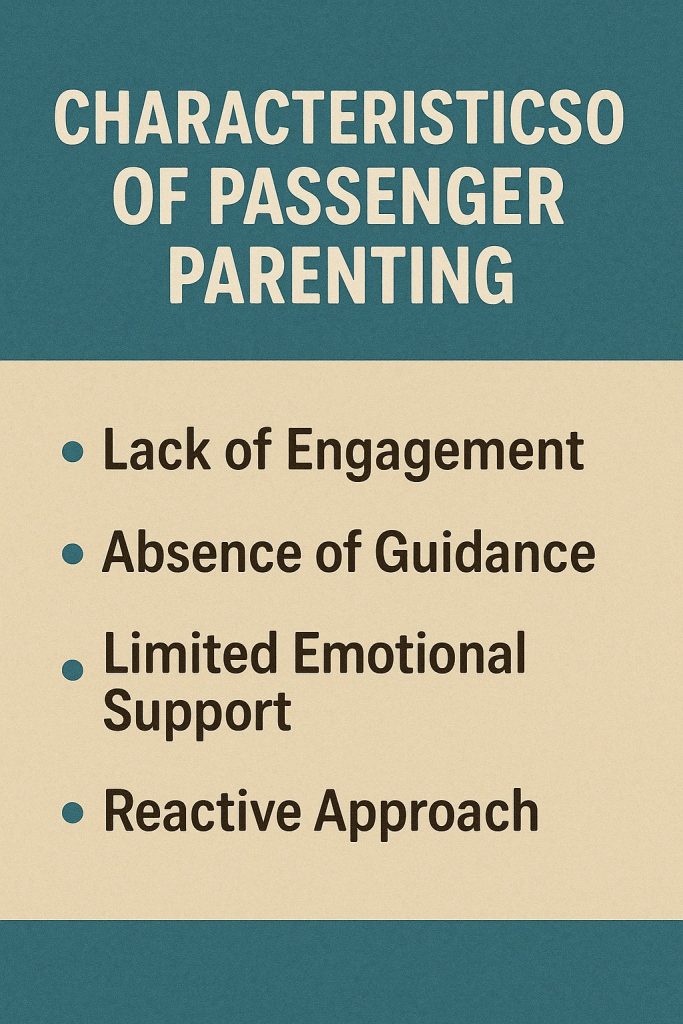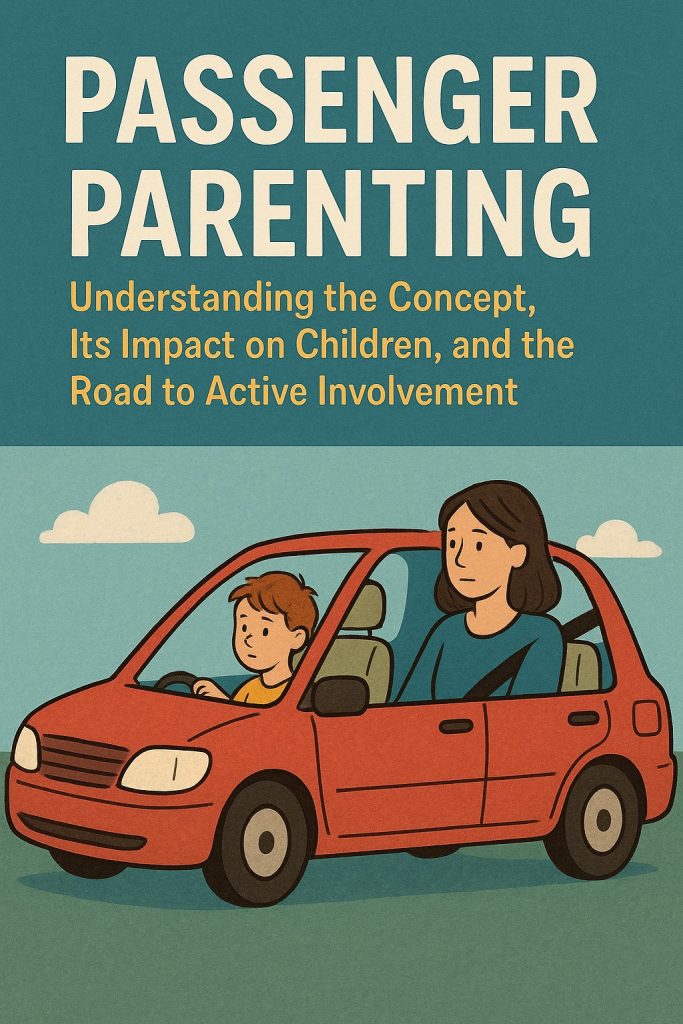“Passenger Parenting: Understanding the Concept, Its Impact on Children, and the Road to Active Involvement”
What is Passenger Parenting?
Parenting is a dynamic and ever-evolving journey. While many terms such as “helicopter parenting,” “authoritative parenting,” or “tiger parenting” have entered mainstream discourse, a newer and increasingly relevant concept is “Passenger Parenting.” The term draws a metaphor from the act of sitting passively in a moving vehicle—present but not involved in steering or navigating the course. A Passenger Parent is physically present in a child’s life but emotionally, mentally, or practically disengaged from key aspects of the child’s development, learning, and emotional world.
Unlike neglectful parenting—where absence is total—passenger parenting is subtle and often unintentional, making it harder to detect and address. Yet, it can have far-reaching consequences on a child’s emotional intelligence, motivation, resilience, and long-term success.


Section 1: Characteristics of Passenger Parenting
Passenger Parenting doesn’t always come from negligence. It often stems from stress, busy lifestyles, lack of awareness, or misguided good intentions. Common characteristics include:
1.1 Passive Involvement
- Parents may attend school functions, provide meals, or supervise screen time but fail to engage meaningfully in conversations, emotional check-ins, or co-learning experiences.
1.2 Reliance on Institutions
- Delegating entire responsibility for the child’s education, discipline, and values to schools or tutors without participating in reinforcement at home.
1.3 Overuse of Digital Distractions
- Parents themselves may be glued to devices or social media, offering only fragmented attention to the child.
1.4 Lack of Emotional Tuning
- The child’s emotions, fears, dreams, or anxieties are rarely discussed. Emotions are often dismissed with, “You’re overreacting” or “Just deal with it.”
1.5 Decision-Making Avoidance
- Major decisions about the child’s interests, education, and activities are left to the child or others without guidance or shared thought.
1.6 Inconsistency in Discipline
- Rules may exist but are inconsistently enforced, causing confusion in expectations and boundaries.
Section 2: Research and Psychological Insights on Passenger Parenting
Though “Passenger Parenting” is an emerging term, its underlying patterns are well-documented in psychological and developmental studies.
2.1 Bowlby’s Attachment Theory
John Bowlby, a pioneer of attachment theory, stressed that children thrive in relationships where caregivers are responsive and engaged. Emotionally unavailable or disengaged parents can lead to insecure attachments, reducing a child’s self-esteem and emotional regulation (Bowlby, 1969).
2.2 Baumrind’s Parenting Styles
Psychologist Diana Baumrind identified four parenting styles:
- Authoritative
- Authoritarian
- Permissive
- Neglectful
Passenger Parenting shares traits with permissive and neglectful styles, especially in the form of emotional absenteeism and poor boundary setting. Studies have shown that children of neglectful parents score lower on measures of achievement and emotional resilience (Baumrind, 1991).
2.3 Impact of Emotional Disengagement
A 2015 study published in The Journal of Family Psychology (Schiffrin et al.) found that low parental emotional engagement is correlated with higher levels of anxiety, depression, and behavioral issues in children and adolescents.
2.4 The “Still Face” Experiment
Edward Tronick’s famous “Still Face” experiment demonstrated how a caregiver’s non-responsiveness can cause immediate emotional distress in infants. Over time, such disengagement can alter neurological and psychological development.
Section 3: Impact on a Child’s Growth and Development
The effects of passenger parenting are often cumulative and can manifest in the following ways:
3.1 Emotional Detachment
Children may feel unimportant or invisible, leading to chronic low self-worth, trust issues, and social withdrawal.
3.2 Poor Academic and Behavioral Outcomes
Without parental monitoring and reinforcement, students may show:
- Low academic motivation
- Difficulty in managing tasks or time
- Higher risk of peer pressure and risky behaviors
3.3 Weak Decision-Making Skills
Because passenger parents rarely guide decision-making, children may struggle with:
- Setting goals
- Weighing consequences
- Self-regulation
3.4 Communication Gaps
A lack of open communication discourages children from sharing problems, doubts, or achievements, leading to secrecy and emotional suppression.
3.5 Delayed Maturity
Children may fail to develop independence or responsibility, expecting others to manage tasks or shield them from life’s difficulties.

Section 4: Real-Life Case Studies
Case Study 1: The Invisible Achiever
Rohan, a 14-year-old boy from Delhi, consistently ranked top of his class. His parents, busy corporate professionals, were proud but rarely involved. Over time, Rohan developed extreme anxiety, fearing failure and perceiving love as conditional on achievement. His emotional breakdown during board exams exposed the cost of parental detachment despite visible success.
Case Study 2: The Lonely Explorer
Anita, a 9-year-old girl, had access to gadgets, hobbies, and even family vacations. However, her parents rarely played, talked, or listened deeply. Anita began bonding more with her online friends and created a secret blog where she expressed her loneliness and feeling “unheard.” A school counselor eventually intervened.
Section 5: Why Do Parents Become “Passengers”?
Understanding the roots can help parents move forward:
5.1 Time Poverty
Busy work schedules and urban lifestyles lead to quantity without quality time.
5.2 Emotional Burnout
Parents themselves may be dealing with unresolved trauma, mental health issues, or stress, making emotional investment difficult.
5.3 Misinformed Love
Some parents believe giving freedom or material comfort is equivalent to good parenting, confusing presence with participation.
5.4 Cultural Factors
In some cultures, emotions are downplayed, and children are expected to “adjust” or “toughen up.”
Section 6: Overcoming the Challenges of Passenger Parenting
The good news: Passenger Parenting is not irreversible. With conscious effort, parents can become more involved, without over-controlling or smothering the child.
6.1 Adopt the “Pilot” Mindset
Start with small intentional actions. Being a “pilot” parent means taking part in the child’s emotional and intellectual journey.
✔ Ask open-ended questions:
- “What made you happy today?”
- “What are you proud of this week?”
✔ Spend distraction-free time daily:
Even 20 minutes of phone-free, eye-contact conversations matter more than hours of physical presence without interaction.
6.2 Learn to Listen, Not Just Hear
Create a culture where feelings are respected. Don’t rush to fix everything. Sometimes, empathetic listening is the most powerful support.
6.3 Create Routines and Rituals
- Family meals, Sunday walks, or bedtime storytelling are rituals that offer safety and bonding.
- Routines also provide structure and accountability.
6.4 Participate in Education and Passions
- Visit schools, meet teachers, or attend exhibitions—not just exams.
- Join your child in their hobbies, even if you’re bad at it. Shared laughter builds bridges.
6.5 Emotional Intelligence Training
Help your child’s name and navigate emotions. Use stories, movies, or role-play to explore emotions like anger, jealousy, and disappointment.
6.6 Seek Professional Help
There is no shame in admitting you need help to re-engage with your child.
Don’t hesitate to consult family counselors, parenting coaches, or support groups.
Section 7: Active Parenting – A Balancing Act
Active parenting doesn’t mean controlling or over-monitoring. It means:
| Passenger Parenting | Active Parenting |
| “What did you score?” | “What did you learn?” |
| Silent car rides | Conversations on life |
| “Go play alone” | “Let’s play together” |
| “Do what you want” | “Let’s decide together” |
| “Later, I’m busy” | “Let’s talk for 10 mins now” |
| Passenger Parenting | Active Parenting |
The goal is to strike a balance between guidance and independence. Children need boundaries, but also freedom within them.
Section 8: Long-Term Benefits of Shifting Gears
Transitioning from a passenger to an active parent has measurable benefits:
- Improved emotional resilience in children
- Greater academic and career success
- Stronger parent-child trust and communication
- Reduced behavioral issues
- Higher life satisfaction for both child and parent
Conclusion: The Journey Ahead
Parenting is not about perfection—it’s about presence, participation, and progress.
Passenger Parenting can happen to the best of us, often without our awareness. But recognizing the signs and deciding to “take the wheel” can change a child’s life trajectory.
In an age where distractions are many, and time is scarce, intentional parenting is the need of the hour. It’s not about grand gestures but about showing up, again and again, with empathy, curiosity, and love.
References
Siegel, D.J., & Bryson, T.P. (2011). The Whole-Brain Child: 12 Revolutionary Strategies to Nurture Your Child’s Developing Mind
Bowlby, J. (1969). Attachment and Loss
Baumrind, D. (1991). The Influence of Parenting Style on Adolescent Competence and Substance Use. Journal of Early Adolescence
Schiffrin, H.H. et al. (2015). Helping or Hovering? The Effects of Helicopter Parenting on College Students’ Well-Being. Journal of Child and Family Studies
Tronick, E. (1978). The Still Face Experiment
Grolnick, W.S., & Slowiaczek, M.L. (1994). Parents’ Involvement in Children’s Schooling: A Multidimensional Conceptualization and Motivational Model

Resources and References



[…] ← Previous […]